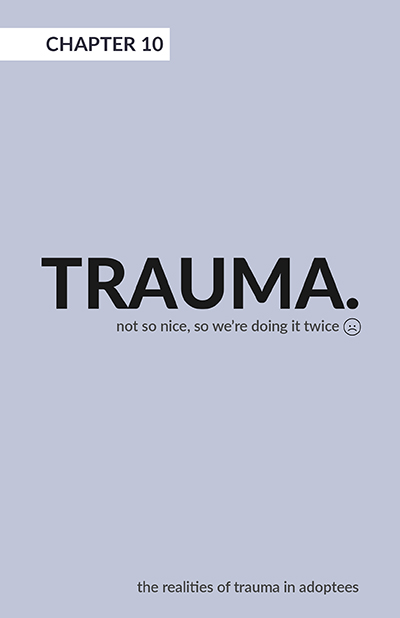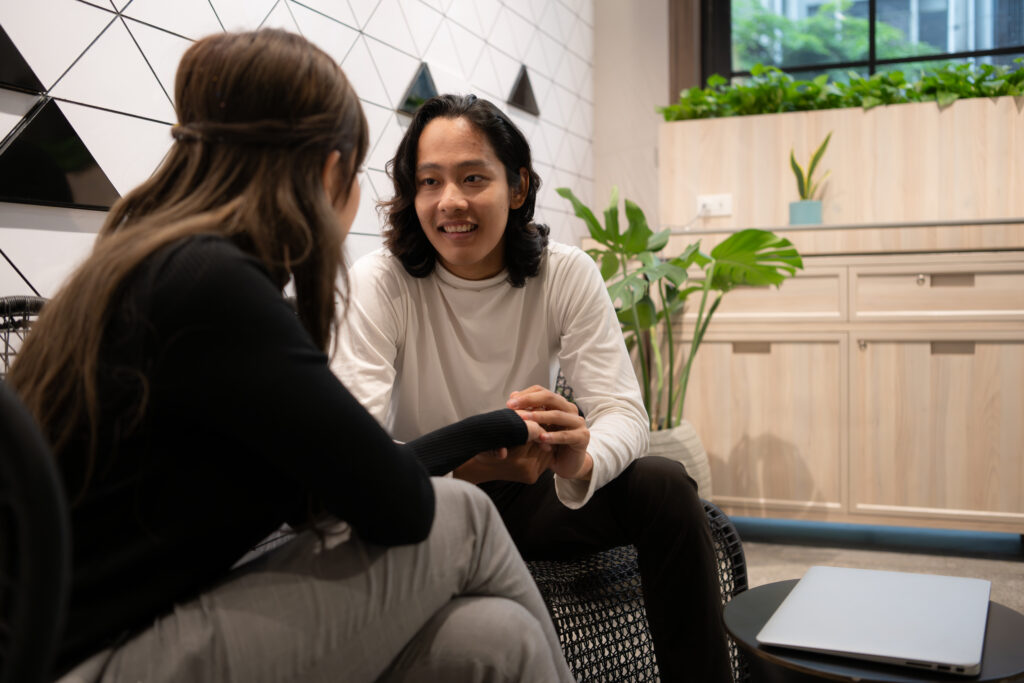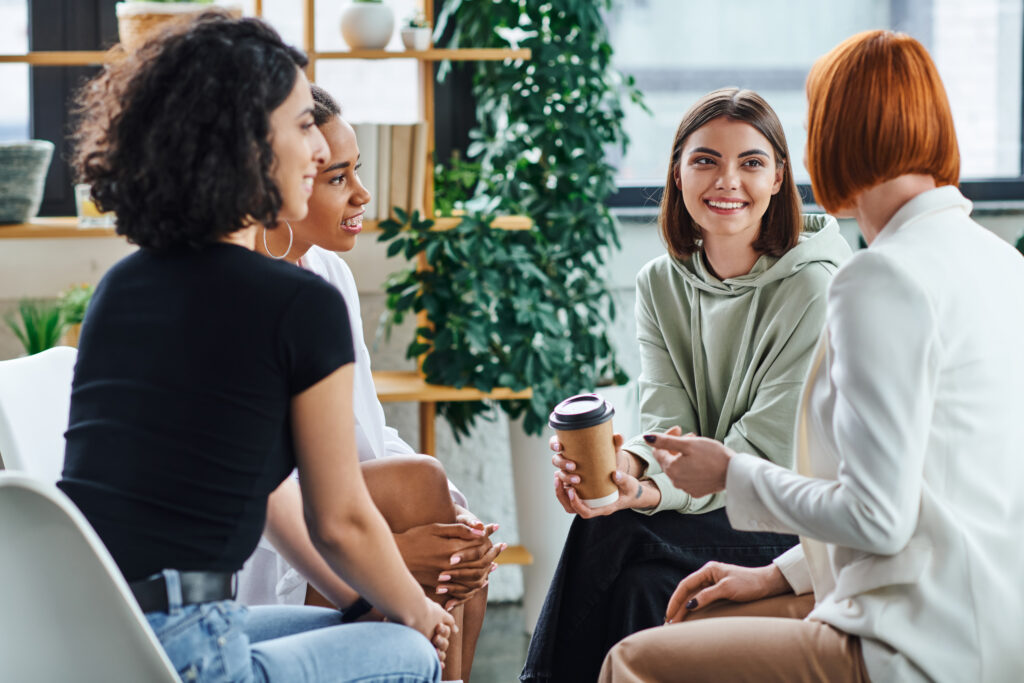
One adoptee said this about trauma, “As an adoptee what I wish people would understand is that when we talk about trauma it doesn’t mean we’re necessarily broken. Some adoptees ARE broken, they are horribly broken and that is a reality and tragedy of adoption.
For me personally I’m not broken, but I’m definitely a little bent. I struggle with some stuff but I’ve learned tools to cope. I do have very strong feelings about birth parents who won’t reunite. I have strong feelings about birth parents who don’t have contact when they can because it’s too hard for them. I have strong feelings about AP’s who think open adoption is sending pictures and a letter to the agency every 6 months because I fail to see how that helps your adoptee. As an adoptee it’s difficult to see these things happen, it triggers me. It’s why I’m so passionate about certain topics-it’s exhausting. It’s exhausting to be slammed right back into my trauma, which is why at times I leave adoption land for a break.”
Open Adoption
Open Adoption has only recently become the norm in most adoptions today. For many, they still have limited access or knowledge of their birth parents and family. It’s often a juggling game with adoptees hearts on how they show love and how and with who they share their true feelings. One adoptee said, “I’m totally that adoptee that feels like I always have to give a disclaimer that my life wasn’t terrible, but there is a feeling of happiness and sadness at the same time and therefore, lots of guilt because you don’t want to hurt anyone’s feelings or put your parents in a bad light. I don’t feel like I can truthfully explain my feelings surrounding adoption because any of the hard parts may label me as ungrateful or angry.” Listening to adoptees and validating all of their feelings, especially the hard and complicated ones is essential.
International Adoption
International Adoption adds many more layers of loss to an adoptee. One adoptee said, “As a transracial adoptee, I lost the opportunity to grow up in a culture that explains my brown skin and dark curly hair, and knowing other people who look just like me. Don’t get me wrong, I am BEYOND grateful and blessed to have been adopted! I’m well aware that the country I came from is poverty stricken, extremely dangerous for young people and rife with gang violence; but it’s also beautiful, has a different history, foods and language. My mom did the best job she could introducing me to that culture, but it wasn’t the same. Sometimes I feel sad that I feel like America is a bigger part of me than El Salvador. I also lost out on getting to grow up knowing my birth mom. If I had a relationship with her, I believe my life would be different (in good way!). But closed adoptions were just how it was with international adoptions in the 80s. I did suffer a great loss of personal and cultural identity, and I didn’t even realize it until I was away from home and in college. Even as a little girl I felt a really deep loss and I just missed my mom so much.”
Some think about the everyday things and celebrations they missed out on, “As an adoptee I lost out on 21 years of memories I could have made with my birth mom. 21 birthdays without her.”
We asked adoptees when they remember feeling trauma and one said, “The sadness didn’t really hit me until adulthood, I think? Maybe late teens. My adoption was closed though and from another state. Meeting with my
biological family wasn’t an option. As you know, I just reunited with my family, and it was beautiful and sweet.”
Another said, “Since I was older (almost 7v) when my adoption happened, I felt sad at the beginning and very confused since suddenly my two brothers and I had a new mom and dad. I then buried it (unknowingly obviously) and didn’t really question anything till I was 16 (the same age my birthmother had me). I acted out through rebelling and defying my parents in several ways, but then got married at 20 and lived 10 more years without thinking much about it. When I was 30 (9 years ago) sadness and questions come over me again. I was finally old enough to understand it was hopefully in my power if I wanted to reunite. And I did. I Found my birth mom and 4 years later my birth dad. For many years those feelings were talked about and I sought therapy (finally). Now at 39, my relationship with my birth mother isn’t what I had hoped it to be. With my birth dad we are close however he just moved back across the country and it makes me sad that we don’t talk as much. But my life is busy and so is his so I get it.”
One adoptee talked not about the age, but how it felt. They said, “honestly the hard feelings come in waves. When I didn’t know my birth mom and siblings (closed adoption), I think I was able to repress the feelings of wonder and longing a lot easier. But also, it was not healthy.
Now that we have reconnected (at the age of 37) and have a growing and sweet relationship I long for them more, for sure have deep waves of sadness that I missed so many years knowing them, and don’t want to leave when we do get to see them every few months.”
Reunification can bring up feelings that adoptees are not expecting. One said, “I reunited with my birth mom in 2016 and I’m in the middle of trauma therapy for other things in my life. We’re just now discovering how my thinking and actions that lead to some of my traumas are directly linked to the fact of being adopted. For example, my fear of abandonment which lead to victim compliance and feeling like I constantly have to prove myself useful in order for people to want to keep me around. The trauma starts in utero when our brain stems develop. We’re able to sense and feel the emotional and mental turmoil of our birth mothers and that right there already starts restructuring our brains.”
Recent studies have accumulated evidence supporting the notion that trauma, such as childhood abuse, family violence, or food insecurity, among various other factors, has the potential to transmit its effects from one generation to the next.
How does this happen?
They found that traumatic experiences can leave a chemical mark on a person’s genes, and these modifications may subsequently be inherited by future generations. It’s important to note that these modifications do not induce genetic mutations; rather, they influence the way in which the genes are expressed. This influence is not of a genetic nature but rather occurs through epigenetic mechanisms.
One adoptee shared, “Trauma creates a hypersensitivity of the alarm in the brain that should go off when you’re in danger or when something emotionally difficult occurs. Since we all have a spinal cord and the brain and body are connected, the alarm goes off in our head and then our body feels it. I’ve noticed in my life when I am emotionally rejected by my adopted mother or other significant relationships, I feel pain in my body. When I was in the midst of doing EMDR therapy I realized that my legs hurt so badly and my arms due to sexual abuse from my older sister and realized that’s where she would hold me down. I would go home from the sessions and my legs would go numb each night. Through continued therapy I was able to replace the images in my mind and metaphorically move the sensations out of my arms and legs. It was life changing and now every winter I don’t have pain in those places. I do notice though when I’m emotionally hurt by my adopted mother the pain returns. It’s very difficult to manage when she won’t own up to her hurtful words and actions. I’ve had to do a lot of therapy to realize that she isn’t perfect and that I haven’t done anything wrong to move through these times. Trauma informed therapy is a must in my eyes in order to take care of these wounds that so clearly impact the body.”
When asked about the hard parts of adoption, one adoptee said, “Being adopted sucks! I’m a reunited adoptee for 6 years now. My birth mom lives here locally and the last of my seven siblings just moved here- so all of my mom’s kids are living locally for the first time ever since I reunited and the first time in years and years before I reunited with her.
I just opened Facebook this morning to see my mom posted family pictures. I wasn’t told about them, asked or invited to be part of them. Nothing. I’m completely shattered and confused. My mom and I have hit a rough patch over the last five months where she’s hardly spoken to me. I wasn’t invited to Thanksgiving- that’s how hard her heels are in the ground. To see family pictures where I should be is just a whole new level of hurt.
Being in adoptee shoes today sucks and hurts. Why does it have to be so complicated??”
What has helped?

An adoptee said, “I am an adoptee that comes from a family where all my siblings and many cousins, aunts and uncles are also adopted. I have always tried to come at it from a place of positive outcomes, while understanding the opportunity for great growth in this life usually stems from great pain. Pain of loss on by birth mother’s side, hurt I caused my mother growing up, my self-inflicted pain from stupid decisions. Families are an interactive generational process for good no matter what form they come in. Sometimes we just need to make sure we educate and express our pains to our family to make sure we aren’t keeping it all inside.”
Another adoptee had this advice, “Please stop telling adoptees that their depression, anxiety, issues with addiction, suicidal tendencies, issues with interpersonal relationships etc., aren’t necessarily because they’re adopted and that those things happen to non-adopted people as well and that all they’re doing is trying to find an excuse.
There are loads and loads of studies about mental health and adoptees. Just because as an AP or birth parent you don’t want to believe your choices caused someone else pain doesn’t mean it didn’t. It’s a hard pill to swallow, I’ll be living this reality myself as an AP one day. I just hope that I don’t try to explain away his pain because I don’t want to face my own responsibility.”
This adoptee had some suggestions on what helped. They said, “I know it’s very different processing emotions at different ages, but as an adult looking back, I wish those open conversations could have happened with my APs (they should have been the ones to start the conversations not waited for me). Now as an adult journaling, prayer, talking with other adoptees, being open with my birth mom who has been amazing at accepting my feelings and sharing hers, and being honest with myself that this is hard stuff and it’s ok to have these waves of sadness. I accept them, don’t fight them anymore, and allow myself to feel it and work through it.
Another adoptee who was almost 40 years old said, “May I make a gentle suggestion? Put that kid in therapy, starting young. Adoption was always celebrated in my house growing up. We had a closed adoption, but we prayed for my birth family, and talked about them. My parents even offered once or twice for me to go to therapy and I said no. But now, as an adult, I realize I had all these confusing feelings about my family and identity and didn’t want my parents to know because I didn’t want to hurt their feelings.”
When young children are feeling trauma surrounding their adoption, more advice was given, including to talk to them openly about what they are feeling. Validate their feelings instead of being defensive. Give them tools like breathing exercises to help calm their bodies. A book series that was suggested to help identify their emotions was ‘Spot of Emotion’. If you are having a visit and leaving is traumatic, try to give them a time countdown when you will be leaving to help them gauge the time. Help them create their own goodbye ritual. Reassure them it is ok to be sad about leaving or whatever other feelings they may be having. Space out longer visits with breaks in between to decompress-it may be a few hours or even a full day. Give yourself some down time as well so you can be there for your child mentally.
Don’t do this alone.
The worst thing you can do when your child who is adopted is experiencing trauma responses is nothing.
• Research different therapy methods that are specific to truama.
• Find a trauma-informed therapist that also specializes in adoption to help you find different ways to help with trauma.
• Find support groups in your community or online that you can turn to because they get what you are going through.
Know that you are not alone. There is help out there.
